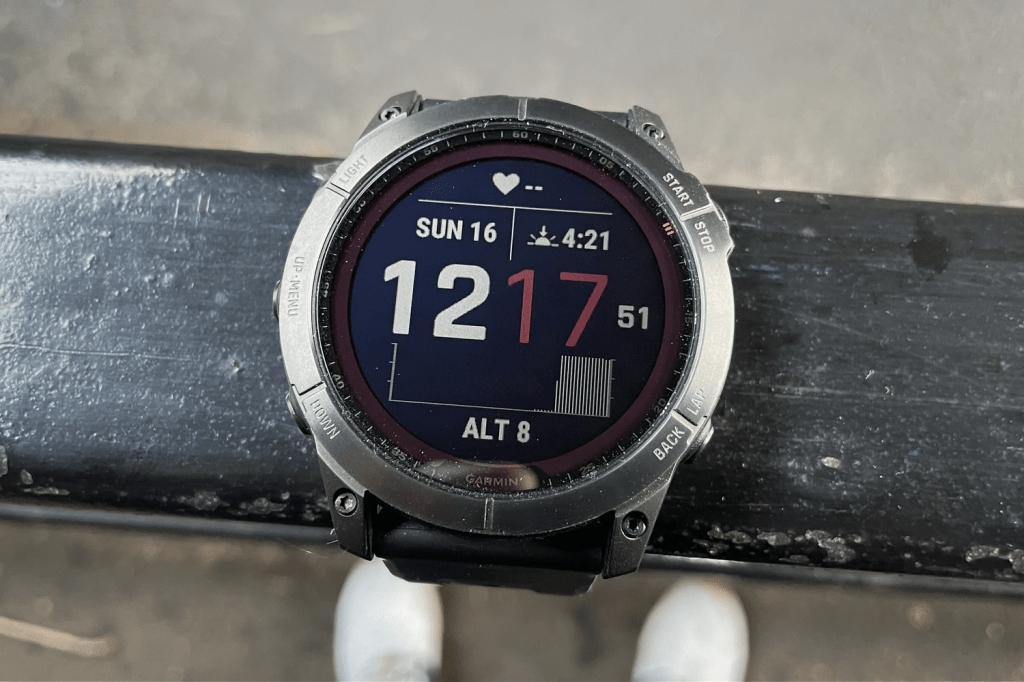
If you exercise without tracking it, did you exercise at all? Don’t take the risk of missing a discipline: strap the best running watch to your wrist for a guaranteed calorie count while you’re doing sports.
Whether you’re a runner, a lunger or just looking to get a bit fitter, the top tickers offer total fitness assistance. The top options below can analyse your activity, provide detailed training feedback and guide you to a new PB – on the road, in the gym or underwater.
Besides keeping tabs on your sweaty metrics, today’s crop of clever trackers can also monitor your sleep quality, move you with music and steer you down the right path. All you have to do is wear one. And, you know, move.
If you’re after a more generic smartwatch, check out our guide to the best smartwatches as well, and if you’re looking to completely update your workout gear, read about the best workout shoes and the best running shoes.
Not sure which is right for you? From sporty smartwatches to premium monitors, the guide below features something to suit every wrist and budget. Plus some handy buying tips to help you pick your perfect ticker.
What is the best running watch?
We think the Garmin Fenix 7 (buy now) is the best running watch you can buy today. Rated for up to 89 hours of battery life with full GPS enabled, it offers dedicated sports profiles for an impressive number of activities, with deep-dive metrics for serious athletes to help improve their performance.
Other GPS watch recommendations
Before we jump into the full list of the best running watches you can buy right now, here’s a quick peek at our top three selections:
The best running watches you can buy today:
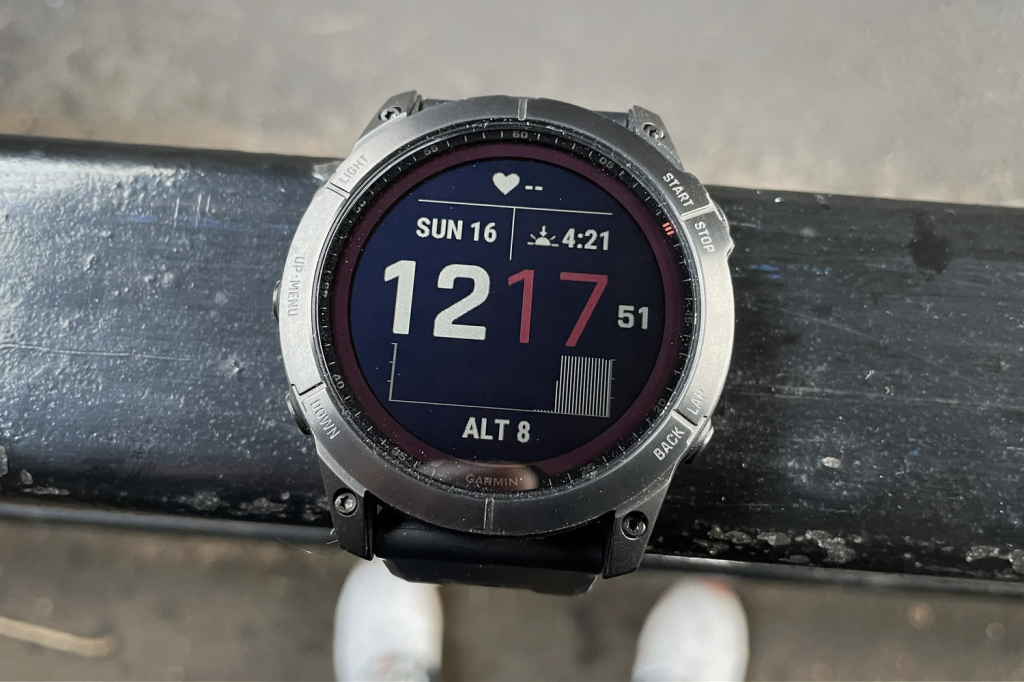

1. Garmin Fenix 7
| Garmin Fenix 7 specs | |
|---|---|
| Display | 1.3in AMOLED touchscreen, 260×260 pixels |
| Heart rate | Yes |
| Battery | 18 days (smartwatch), 57 days (battery saver), 10 hours (all satellite systems with music) |
| Waterproof | 100m |
| Case size | 42/47/51mm |
| Weight | 79g |
Garmin has cemented its Fenix series as the top choice for serious athletes in need of a serious tracking tool. And with dedicated sports profiles for a huge number of disciplines – spanning from HIIT to hiking – plus a whole range of training metrics fed by its arsenal of sensors, the Fenix 7 stays true to that template.
Rated for up to 89 hours of battery life with full GPS enabled, the Fenix 7 is equipped to go the distance – and then some. Power Manager offers granular fine-tuning to eke the very most out of every charge. Opt for the top-spec 7X Solar edition and it’ll refuel from the sun.
Built for bossing almost any sport, the Fenix 7 is as handy at tracking daily wellness as it is at providing real-time stamina estimates. Support for contactless payments and offline Amazon Music mean this durable ticker is no connected dum-dum, while support for TOPO maps makes it a navigational powerhouse.
The only fly in this capable ointment? The sizeable price tag puts the Fenix 7 firmly into premium territory. But if your budget stretches (and your pursuits demand it), this is the ultimate combo of tracking smarts and sporting endurance.
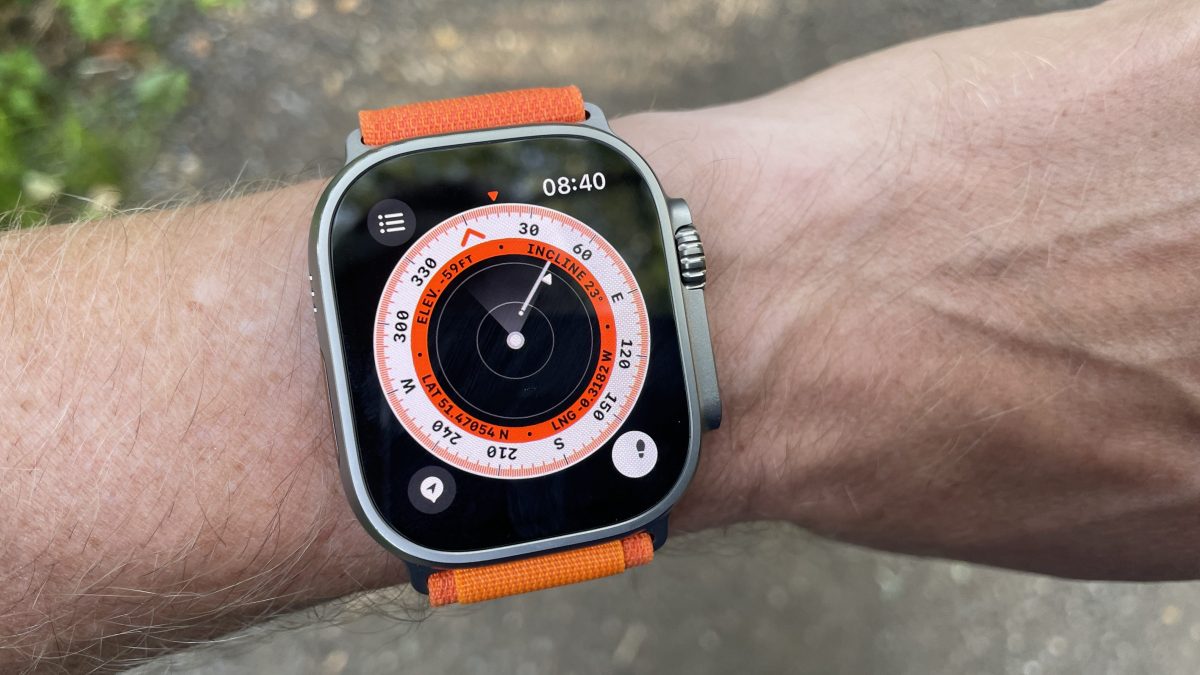

2. Apple Watch Ultra
| Apple Watch Ultra specs | |
|---|---|
| Display | Always-on 2000nit retina display, 410 x 502 pixels |
| Heart rate | Yes |
| Battery | 60 hours (low-power settings) |
| Waterproof | 100m |
| Case size | 49mm |
| Weight | 61g |
Let’s be clear — the Apple Watch Ultra won’t offer the same longevity as more established Garmin models. But if you’re set on an Apple Watch for your next GPS watch, then the Ultra is the best of the best.
Stunning design aside, it still serves up the best battery life of any Apple Watch to date, with a gorgeous screen that’s a pleasure to behold. Packed with the latest features, it’ll cover the fitness and health tracking needs of practically anyone, with Apple’s well-stocked app ecosystem at your disposal.
Ultimately, if you’re an iPhone owner and want to enjoy the best watch the company has to offer, the Ultra is the one for you.
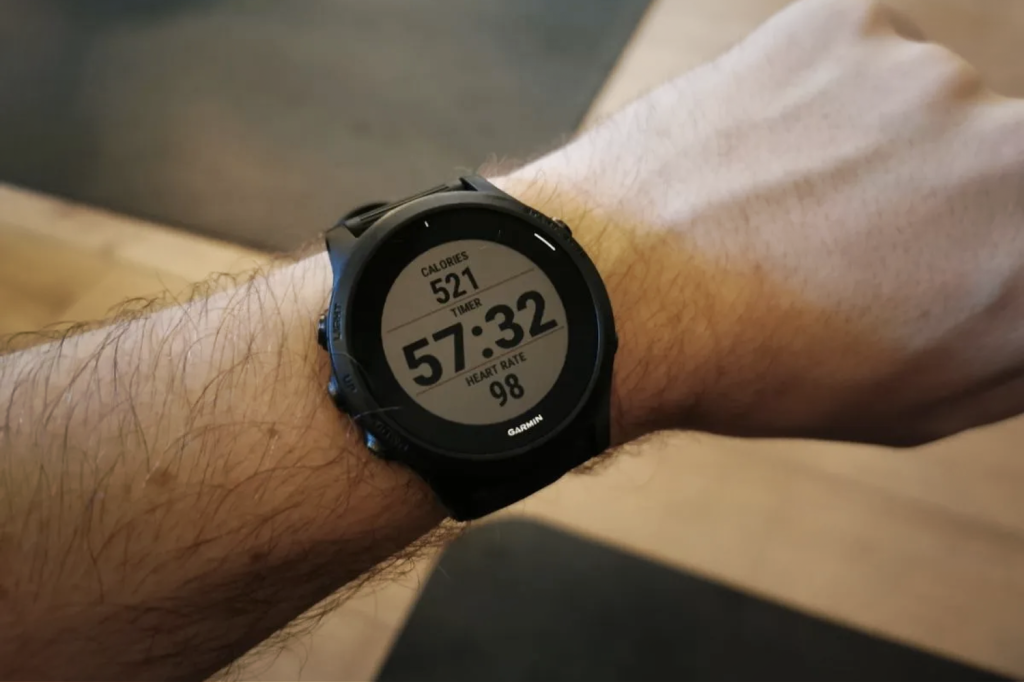

3. Garmin Forerunner 945
| Garmin Forerunner 945 specs | |
|---|---|
| Display | 1.2in MIP, 240×240 pixels |
| Heart rate | Yes |
| Battery | 2 weeks (smartwatch), 10 hours (GPS with music) |
| Waterproof | 50m |
| Case size | 47mm |
| Weight | 50g |
Not the sleekest of tracking tools, Garmin’s Forerunner 945 is designed for those who want fitness insights without the extra baggage. And while it’s not the newest release in Garmin’s stable, it remains an excellent GPS sports watch for exercise – and one that’s now available for a little bit less.
Its design clearly favours function over form: its fibre-reinforced polymer plastic shell didn’t win any design awards back in 2019. But there’s nothing wrong with minimalism if it gets the job done, and that’s exactly what this streamlined 50g lightweight achieves.
Sticking with the pared-back approach, there’s no touchscreen. Instead, you’re reliant on sturdy metal buttons. Paired with a dull 1.2in LCD, this approach delivers a respectable 36-hour GPS battery life. But it doesn’t go light on tracking tech: its full complement of sensors includes optical heart rate, GPS and blood oxygen.
It’s accurate, it records everything you need and the partner app is perfect for diving into the data. The 945 can also store offline music from services including Spotify, plus it supports Garmin Pay. There are newer, shinier options out there – and several which are easier to master – but the 945 nevertheless remains a well-built, feature-rich GPS sports watch free from bloat.
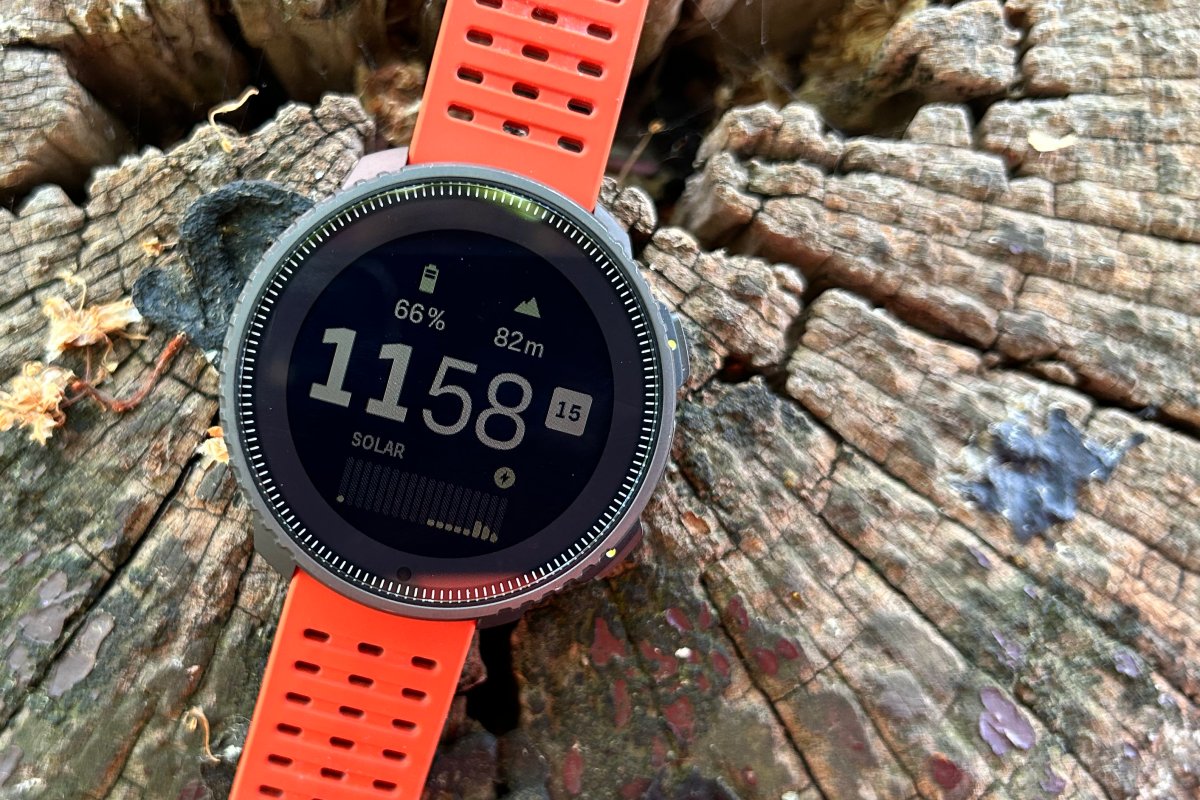

4. Suunto Vertical
| Suunto Vertical specs | |
|---|---|
| Display | 1.61/1.9in LTPO OLED touchscreen, 352×430/396×484 pixels |
| Heart rate | Yes |
| Battery | 18 hours |
| Waterproof | 50m |
| Case size | 41/45mm |
| Weight | 32g (41mm, aluminium), 38.8g (45mm, aluminium) |
There’s plenty to love about the Suunto Vertical. Bringing the fight straight to the long-established likes of Garmin and co. it provides quality features like mapping support and dual-band GPS for reliable outdoor activity tracking, with an impressive battery life to boot — bolstered by solar charging.
With blood oxygen tracking, sleep tracking, and all the usual sports and fitness modes you’d expect, it ticks all the boxes, including design. If you can get past the software niggles (which are still holding Suunto back from truly matching some high-end rivals), then this is a formidable GPS watch which is crammed with impressive features.
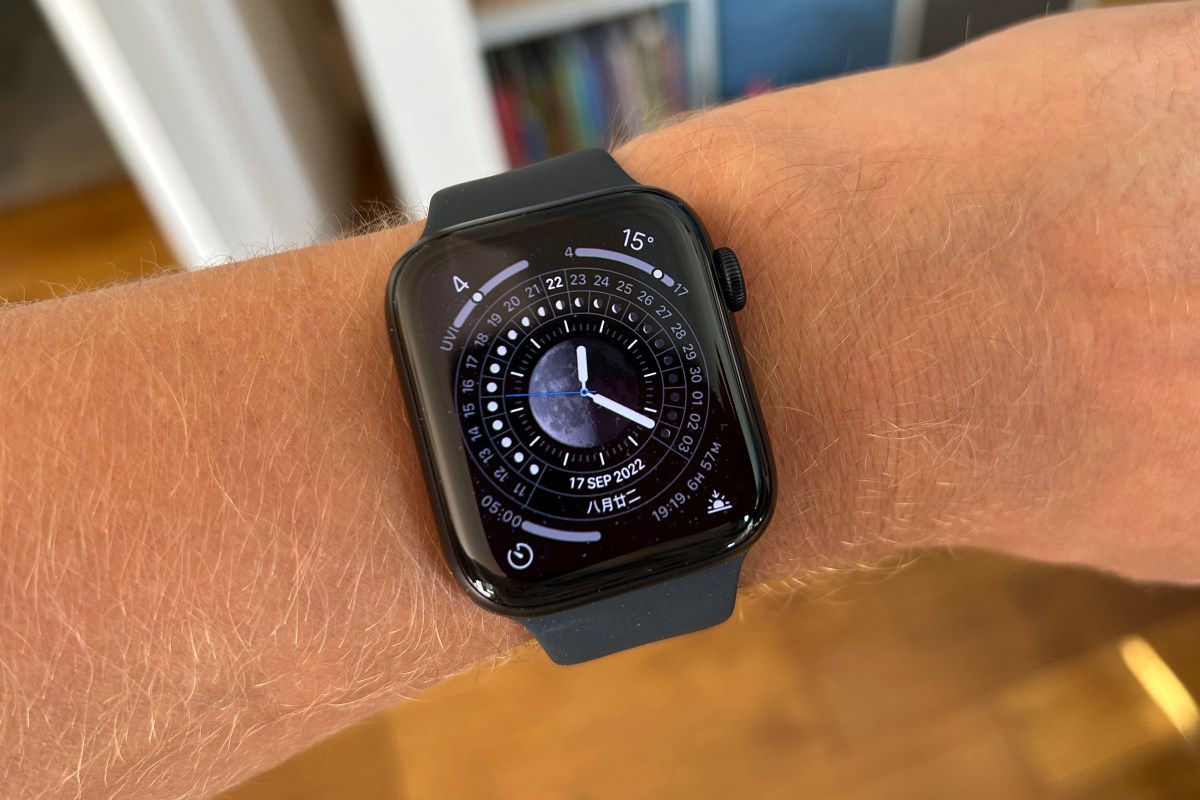

5. Apple Watch SE 2022
| Apple Watch SE 2022 specs | |
|---|---|
| Display | Retina display, 368×448/324×394 pixels |
| Heart rate | Yes |
| Battery | 18 hours |
| Waterproof | 50m |
| Case size | 44/40mm |
| Weight | 33g (44mm), 28g (45mm) |
In terms of sheer value, the Apple Watch SE (2022 model) is comfortably the best Apple Watch for most people, offering all the key Apple Watch features for a price that’s more palatable than its Series 8 and Ultra siblings.
Despite its lower price, it shares the same latest-gen processor for slick operation, with all the sleep, fitness, exercise and GPS- sports tracking you’ll need.
Throw in its unmistakable Apple Watch design, app support, Apple Pay, and more, it’s clear to see why the Apple Watch SE is regarded to be the best choice for most iPhone owners.
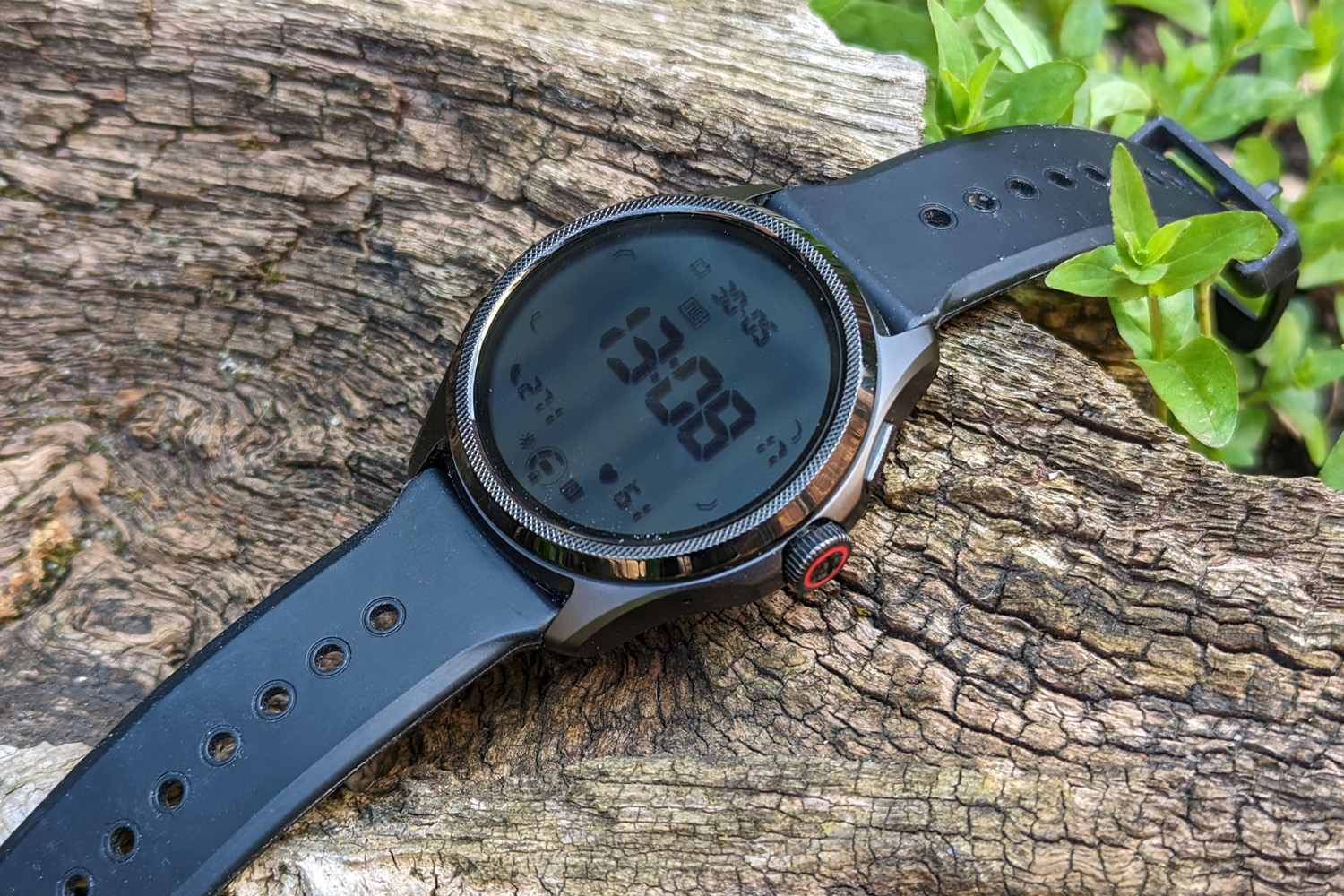

6. Mobvoi TicWatch Pro 5
| Mobvoi TicWatch Pro 5 specs | |
|---|---|
| Display | 1.43in OLED, 466×466 pixels |
| Heart rate | Yes |
| Battery | 80 hours (normal), 45 days (Essential mode) |
| Waterproof | 5ATM |
| Case size | 50mm |
| Weight | 44.4g |
Mobvoi’s TicWatch Pro 5 is one of the most powerful smartwatches around, thanks to the latest generation Qualcomm Snapdragon Wear W5+ processor. All that power makes for a slick and smooth experience, with all the GPS-tracking sports and fitness features you’ll need to keep you in tip-top shape.
With a premium build and seriously impressive battery life (for a smartwatch) due to a clever dual-screen design, it’s one of the best GPS watches around right now, with a suitable price tag to match.
If you can get past its large size and lack of a digital assistant, it’s easily one of the best choices for those looking for an Android-friendly GPS watch.
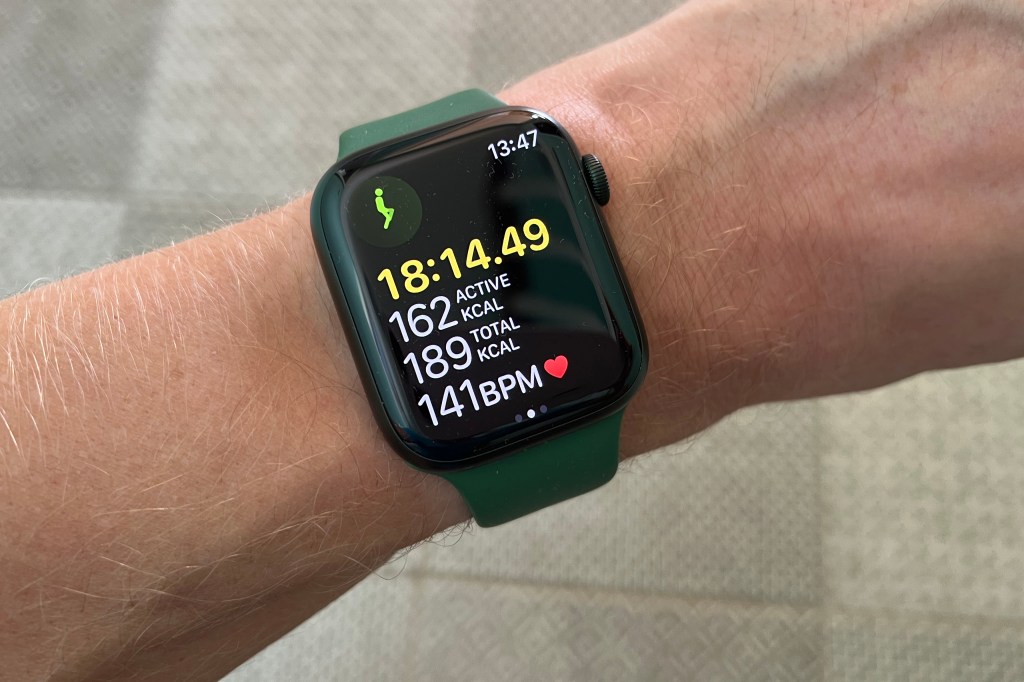

7. Apple Watch Series 8
| Apple Watch Series 8 specs | |
|---|---|
| Display | 1.61/1.9in LTPO OLED touchscreen, 352×430/396×484 pixels |
| Heart rate | Yes |
| Battery | 18 hours |
| Waterproof | 50m |
| Case size | 41/45mm |
| Weight | 32g (41mm, aluminium), 38.8g (45mm, aluminium) |
For most people, Apple’s understated wearable is one of the best smartwatches you can buy. But it’s also a top GPS sports watch in its own right: waterproof to 50m, it comes equipped with blood oxygen, ECG and optical heart rate sensors to keep track of your vitals. It can even detect irregular heartbeats protect your hearing and alert emergency services if you take a tumble.
It also comes complete with Apple’s comprehensive suite of health and fitness features, including all-round activity tracking, dedicated sports profiles with matching metrics, plus full-fat sleep tracking and schedules. The Series 8 is also the perfect partner to Apple’s Fitness+ platform, syncing with your iPhone, iPad or Apple TV to track your numbers while you work out.
Its vibrant, tactile interface looks even better on the Series 7’s OLED display, which is roughly 20% larger than before. Whether you’re tapping into Reflect mindfulness sessions or swiping around the Watch’s wellness tools, everything is big, bold and intuitive.
At 18 hours, battery life could still be beefier, while many will find that the Watch SE (2022) offers better value. But for the smartest sports watch around, you can’t go wrong with the Series 8.
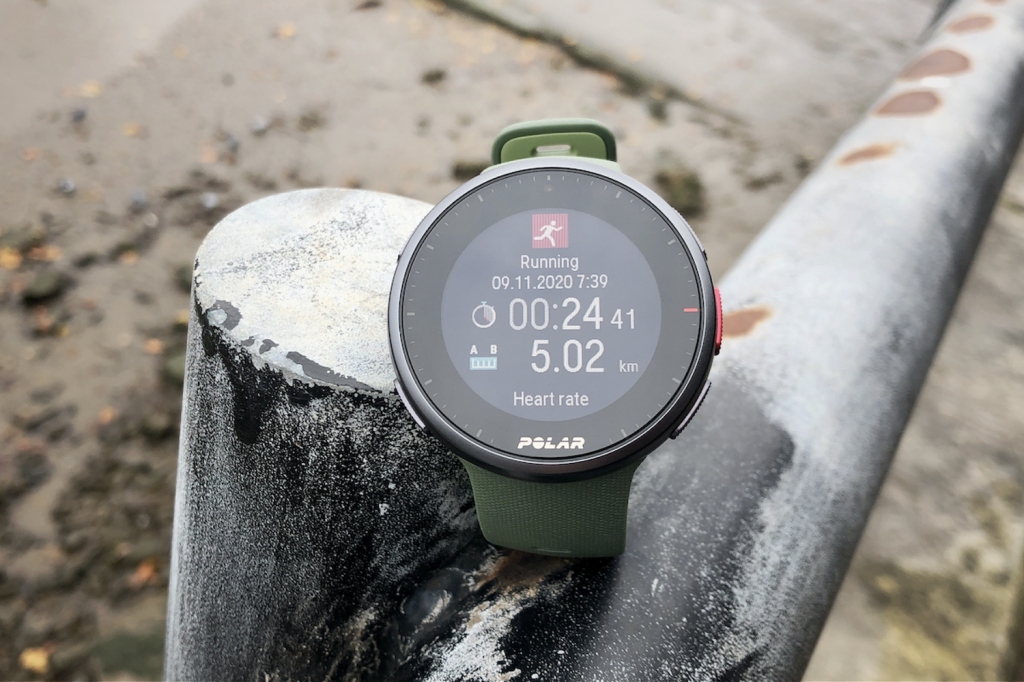

8. Polar Vantage V2
| Polar Vantage V2 specs | |
|---|---|
| Display | 1.2in MIP touchscreen, 240×240 pixels |
| Heart rate | Yes |
| Battery | 7 days (watch), 40 hours (training mode) |
| Waterproof | 100m |
| Case size | 47mm |
| Weight | 52g |
Polar’s Vantage V2 might look like just another tracking ticker, but don’t let its polished shell fool you: the V2 is a comprehensive training tool, designed to log your workouts and then guide you through recovery.
While it’s lightweight at 52g, the Polar’s refined curves belie a tough build: fronted by laminated Gorilla Glass, the aluminium casing is waterproof down to 100m. And though its 1.2in display isn’t the sharpest or brightest, it is big and clear enough to be easily readable on the run.
Pursue a different discipline every weekend of the year and the Vantage V2 will still have a mode to track it. You’ll find 130 activity profiles in the Polar Flow app, up to 20 of which can be loaded onto the V2 at a time. Outdoor activities can be tracked using GPS, with a reliable heart-rate monitor logging your effort.
The app provides no shortage of stats to digest, while the watch itself can suggest the right exercises for your active recovery. There’s not much to customise and there’s no app catalogue to speak of. But as a purist’s training tool with a solid 40-hour battery life, the Vantage V2 is a tough GPS sports watch to beat.
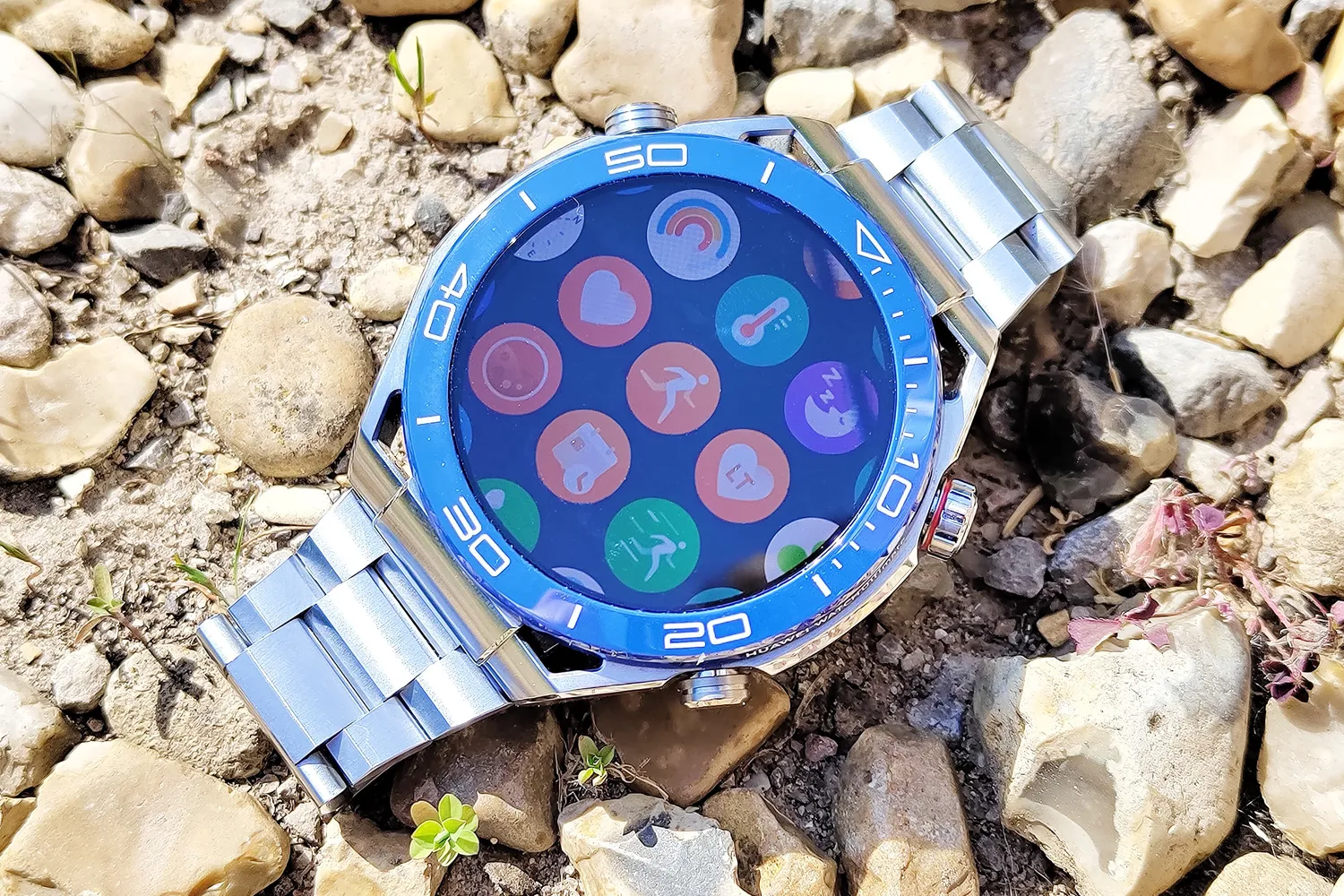

9. Huawei Watch Ultimate
| Huawei Watch Ultimate specs | |
|---|---|
| Display | 1.5in AMOLED touchscreen, 466×466 pixels |
| Heart rate | Yes |
| Battery | 14 days |
| Waterproof | 10ATM |
| Case size | 49mm |
| Weight | 76g |
Ultimate in both name and nature, Huawei’s premium smartwatch offering has a lot going for it. It’s beautiful, for a start, with a zirconium-based liquid metal build that pushes it into luxurious territory unmatched by practically any of its peers.
Build aside, its near-50mm size might be too large for some wrists, but if you can overlook that, then there’s no shortage of features. In addition to all the latest health monitoring like heart rate and ECG, it’s rated for all sorts of diving shenanigans, with key stats like oxygen partial pressure, safety stop times, and more on offer.
GPS tracking is present for landlubbers, while a seriously impressive battery life is another boon. Its only major downside, apart from the lofty price tag, is the fact that you have to jump through a few hoops to download Huawei’s app, and things like contactless payment might not work where you are. If you’re after a truly premium GPS watch experience though, the Ultimate needs to be on your shortlist.
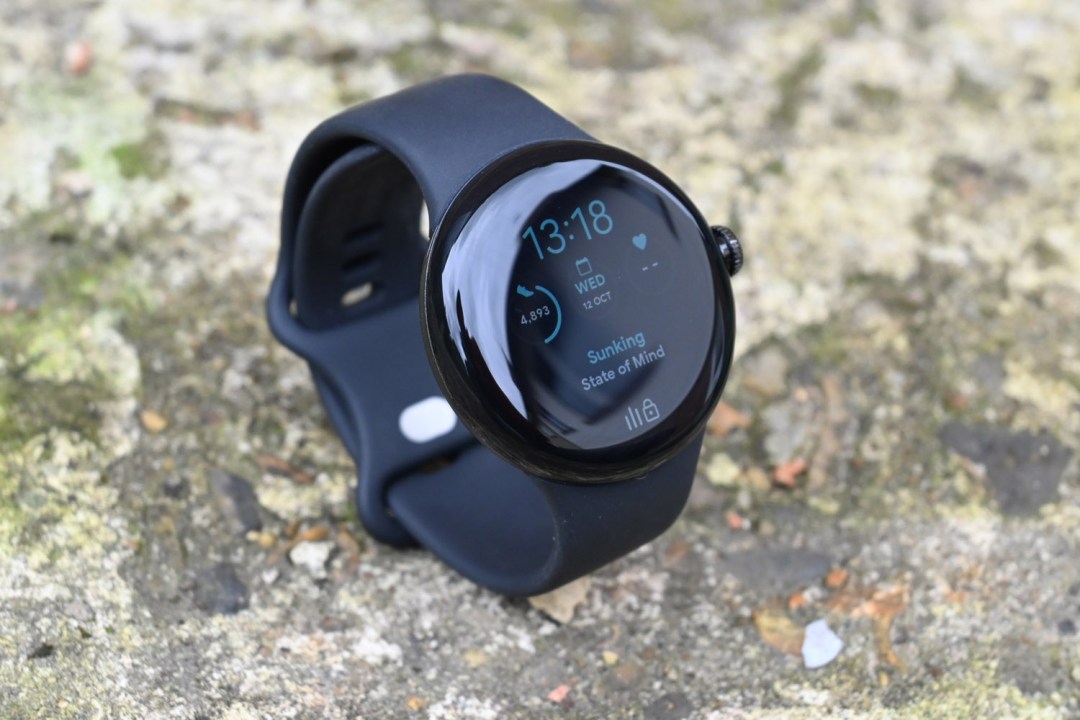

10. Google Pixel Watch
| Google Pixel Watch specs | |
|---|---|
| Display | 1.2in AMOLED, 450×450 pixels |
| Heart rate | Yes |
| Battery | 24 hours (smartwatch) |
| Waterproof | 50m |
| Case size | 31mm |
| Weight | 36g |
Google’s Pixel Watch stands out from the crowd, thanks to its ultra-minimalist design. Practically all-screen, its smooth curves are interrupted only by a snazzy-looking digital crown on the side. Its sleek design won’t be to everyone’s tastes of course, but if you’re after a chunkier, more traditional look, there are plenty of other options out there.
Looks aside, its software is slick too, with comprehensive Fitbit-powered health and activity tracking for all the metrics you’d expect. GPS performance is solid as well, though it lets itself down a bit with a maximum battery life of 24 hours. If you push it hard with an always-on display, you’ll find yourself with less than a full day of use per charge, which might be a dealbreaker for some.
Still, if you’re an Android fan with a penchant for minimalist design and just need to record basic runs (as opposed to gruelling marathons), then the Pixel Watch is still worthy of your consideration.
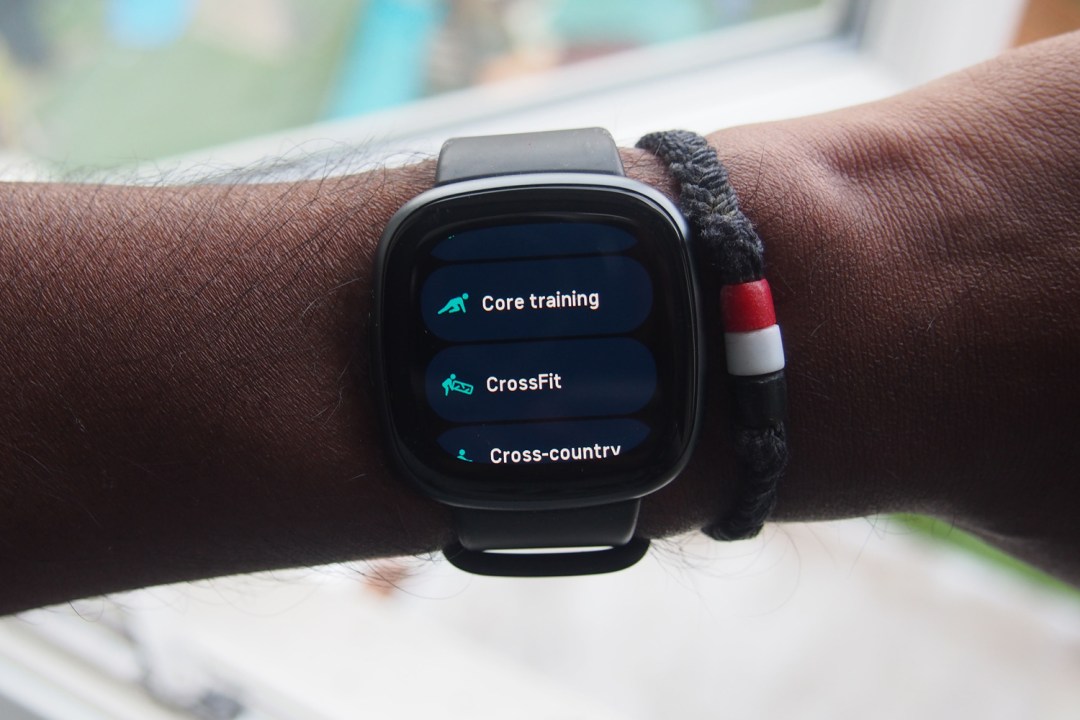

11. Fitbit Versa 4
| Fitbit Versa 4 specs | |
|---|---|
| Display | 1.58in AMOLED, 336×336 pixels |
| Heart rate | Yes |
| Battery | 6+ days |
| Waterproof | 50m |
| Case size | 40.5mm |
| Weight | 38g |
The Versa 4 is more affordable than many of its rivals, providing all the Fitbit tracking and features you’d expect, at a palatable price point. While its square, rounded-corner design won’t be for everyone, there’s no denying that it stands out, and its build quality and choice of colour options are undeniably solid.
While it lacks a few extra features like built-in Wi-Fi or music, it still offers extras like Alexa integration and Google Maps, in addition to a comprehensive library of fitness and sports tracking modes. Built-in GPS and sleep tracking make it a comprehensive tracker overall, which is further boosted by its six-plus day battery life.
It lacks the fancy ECG and EDA sensors found on the more expensive Fitbit Sense 2, but if you’re a fan of the form factor and are happy with its slightly more limited features, then the Versa 4 is a sensible choice.
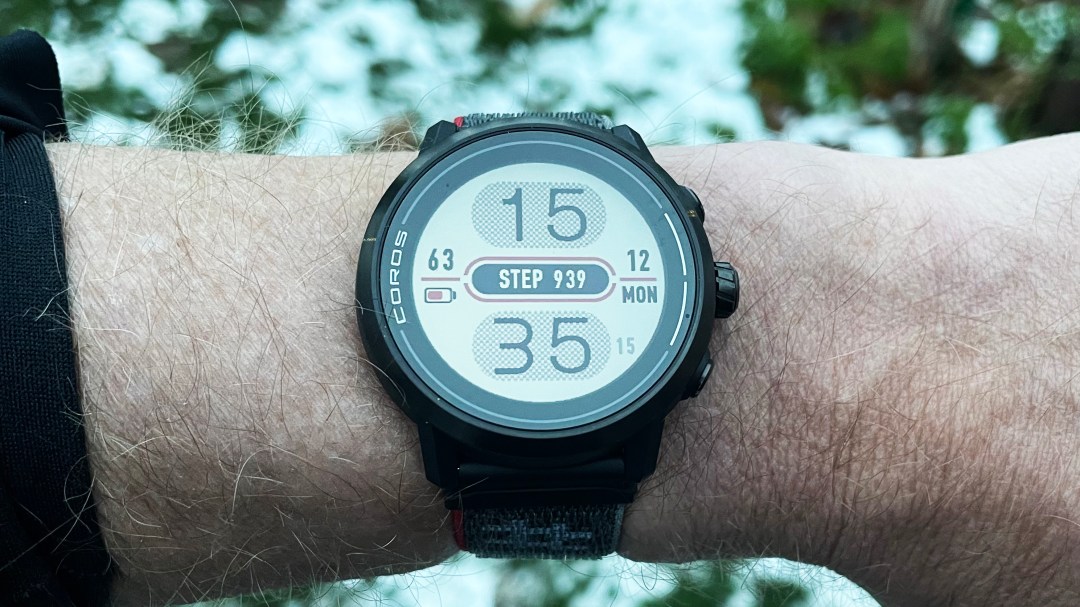

12. Coros Apex 2
| Coros Apex 2 specs | |
|---|---|
| Display | 1.2in LCD, 240×240 pixels |
| Heart rate | Yes |
| Battery | 17 days (GPS 45 hours) |
| Waterproof | 50m |
| Case size | 42mm |
| Weight | 42g |
Coros’ Apex 2 impressed us with its larger battery, which should be good for around 17 days of use in between charges, or an impressive 45 hours in GPS mode. It also has improved HRV/ECG skills thanks to a newer sensor, while nailing things on the multi-sports tracking and stat delivery front too.
It has an LCD display rather than a punchier AMOLED alternative, but we can forgive that omission thanks to the aforementioned battery life. It’s always-on too, which means no messing around with wrist flicks or button taps just to see the time.
The pricier Apex 2 Pro edges out ahead for GPS and heart rate accuracy, but don’t let that fool you — this is still one of the most formidable sport watches on our list.
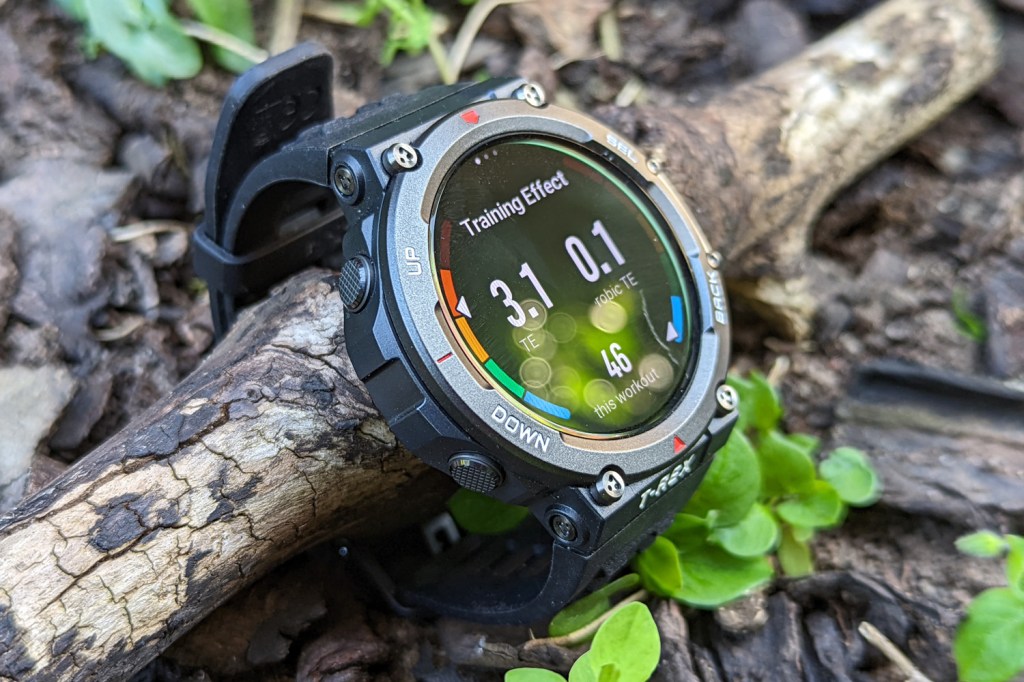

13. Amazfit T-Rex 2
| Amazfit T-Rex 2 specs | |
|---|---|
| Display | 1.39in AMOLED, 454×454 pixels |
| Heart rate | Yes |
| Battery | 24 days (typical), 50 hours (balanced GPS) |
| Waterproof | 100m |
| Case size | 47.1mm |
| Weight | 66.5g |
Not everyone limits their activities to loops around the local park. If your fitness regimen tends towards adventurous, Amazfit’s T-Rex 2 wants in. With a chunky polymer alloy case that’s more than a little bit G-Shock, it’s built to survive some rough and tumble.
There’s no sapphire glass shielding the 1.39in AMOLED display, but the resolution has at least been bumped. Text is sharp, contrast excellent and colours punchy, with respectable viewing angles for good measure.
Amazfit’s Zepp OS is simple to navigate, either by touch or using the physical buttons. It’s functional rather than flashy, putting useful tools front and centre. This pared-back approach is reflected in the limited functionality of pre-installed apps and the absence of a meaningful third-party catalogue – although you can export data to Google Fit, Apple Health and Strava.
Where it doesn’t fall short is fitness skills. The T-Rex 2 can log more than 150 disciplines, deploying a suite of sensors to capture in-depth metrics. Tracking accuracy is largely on par with rivals, even if our testing found heart rate figures to run slightly high. Battery life is also stellar: even with an active lifestyle and the always-on display enabled, ten days is comfortably doable.


14. Huawei Watch GT Runner
| Huawei Watch GT Runner specs | |
|---|---|
| Display | 1.43in AMOLED touchscreen, 466×466 pixels |
| Heart rate | Yes |
| Battery | 14 days |
| Waterproof | 50m |
| Case size | 46mm |
| Weight | 38.5g |
Huawei’s targeting the wrists of sprinters with its Watch GT Runner. And with a sporty design, sizeable battery and heaps of software features for runners – plus a mid-range price tag – it’s a tempting pitch.
Borrowing a fair few features from other Huawei wearables, the Watch GT Runner packages them in a lightweight polymer shell that’s well-suited to sprinting. It shares its 1.43in AMOLED display with the Huawei Watch GT 3 – and it’s just as sharp, responsive and easy to see. GPS tracking is broadly accurate, while results from the heart rate monitor fall within Huawei’s claimed 10bpm margin versus a chest strap.
Huawei’s HarmonyOS interface plays nice with Android, iOS and Huawei’s own phones, but its AppGallery store doesn’t offer the same catalogue depth as its rivals. What you do get is a whole host of running insights, including Huawei’s Running Ability Index, which scores you based on training data and heart rate info. There are AI coaching plans available too, alongside familiar metrics like Training Load, VO2 Max and recovery time.
Smart notification support is limited to Android smartphones, while Huawei’s Celia assistant only works if you have a connected Huawei smartphone. More convincing the flip side is its impressive battery life: 14 days can drop to seven with regular runs, but it’s still a solid tally for a full-colour GPS sports watch with added smarts.
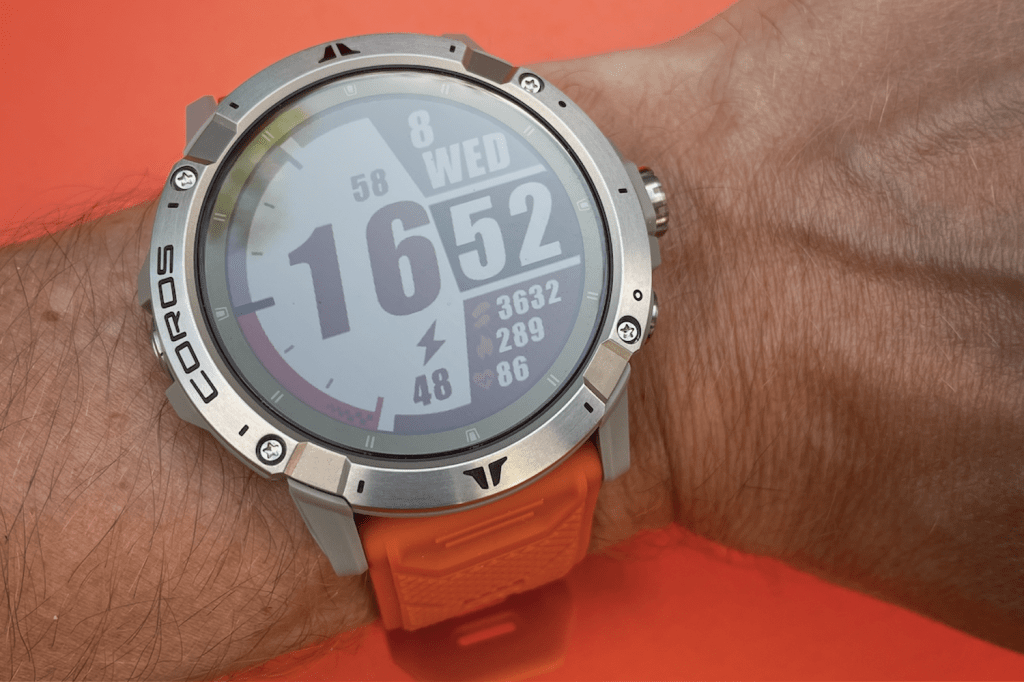

16. Coros Vertix 2
| Coros Vertix 2 specs | |
|---|---|
| Display | 1.4in LCD touchscreen, 280×280 pixels |
| Heart rate | Yes |
| Battery | 100 hours (standard), 60 days (daily use), 35 hours (full GPS with music) |
| Waterproof | 100m |
| Case size | 50mm |
| Weight | 89g |
There’s no escaping the heft of the second-gen Coros Vertix: beefy by design, this premium ticker is not only a considerable investment, but it also takes up a fair chunk of wrist space. Weighty at 89g, it sits high on the wrist, supported by a thick strap. Surrounded by a titanium alloy bezel and casing, the Coros packs a 1.4in LCD touchscreen that’s disappointingly dull.
But the Vertix 2 does back up its chunky shell with an equally sturdy cell inside: good for up 240 hours in UltraMax mode, this is a ticker with endurance. It also goes big on features: there’s sports tracking for almost every activity you can think of, plus multiple mapping options, music storage for offline playback, as well as an almost overwhelming breadth of performance insights from the EvoLab tool.
Swim tracking is similarly comprehensive, both in and out of the pool, and there’s also general activity and sleep-stage data – although you don’t get any of the more holistic wellness features seen on the likes of Garmin or Polar watches.
No lightweight, the Vertix 2 gives the Garmin Fenix a good run for its money – provided you’ve got big wrists and a matching bank balance.


17. Fitbit Sense
| Fitbit Sense specs | |
|---|---|
| Display | 1.58in OLED touchscreen, 336×336 pixels |
| Heart rate | Yes |
| Battery | 6+ days |
| Waterproof | 50m |
| Case size | 40.5mm |
| Weight | 46g |
In a world where your watch is the first line of defence against health complications, Fitbit was the first to ship one with an electrodermal activity sensor, capable of monitoring your stress levels. Add an ECG app and on-wrist skin temperature sensor to Fitbit’s classic all-day activity tracking and the Sense shapes up as a comprehensive wellness tool.
With styling similar to the Versa 2, it adopts a rounded-square face that’s subtle enough to be wearable in the office, but sufficiently unique to have some personality. It’s impressively light, comfortable to wear and benefits from a nice OLED display, although the single capacitive button is a source of frustration.
Getting the most out of the Fitbit Sense requires commitment. If you’re happy to invest vast amounts of health data, you’ll be rewarded with a landslide of feedback and analysis. The app delivers a detailed breakdown of everything from stress factors to sleep scores, but you’ll need a Fitbit Premium subscription to access more advanced insights.
Battery life comes in at a solid six days on average, which only makes the so-so overall performance more disappointing. It’s not consistently smooth in use, often feeling a little underpowered in the processor department.
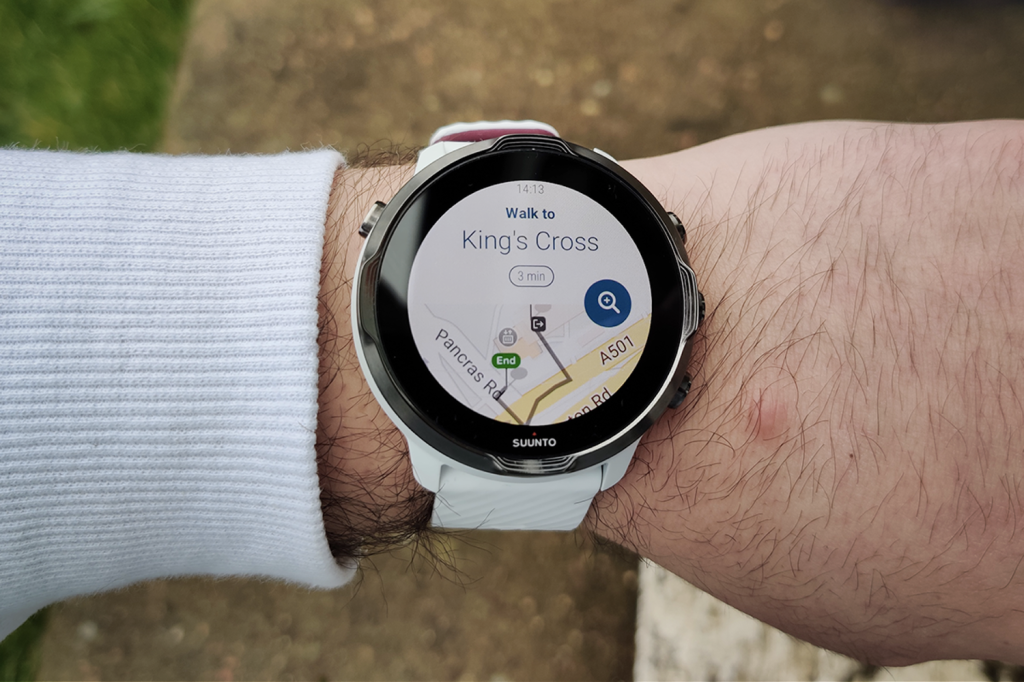

18. Suunto 7
| Suunto 7 specs | |
|---|---|
| Display | 1.4in AMOLED touchscreen, 454×454 pixels |
| Heart rate | Yes |
| Battery | 40 days (time), 12 hours (training), 2 days (smartwatch) |
| Waterproof | 50m |
| Case size | 50mm |
| Weight | 70g |
The Suunto 7 isn’t the most expensive GPS sports watch in this list. But as a rival to the Apple Watch, it also isn’t cheap. Then again, by promising style, Android Wear smarts and a comprehensive suite of fitness-tracking features, it tries to tick all of the the right boxes.
Simultaneously rugged, stylish and sleek, the Suunto 7’s four hardware buttons give it the feel of a traditional sports watch, while its four raised edges add welcome character. It’s inescapably chunky – something unavoidable with its 55mm face – but it’s light enough to be comfortable. The 454×454-pixel display is also up there with some of the best smartwatch screens. Because it’s an AMOLED panel, blacks are true and colours punchy, while the resolution ensures text is sharp.
Wear OS is zippy enough, with a comprehensive app catalogue and payment tech to boot. And as a sports tracker, it also comes well-equipped: its built-in app covers all the main disciplines, with the option to install a whole range of third-party tools as you fancy.
GPS proves reliably accurate, while battery life can stretch to two days if you’re careful. That’s better than an Apple Watch, but still pretty limited for serious sports enthusiasts.
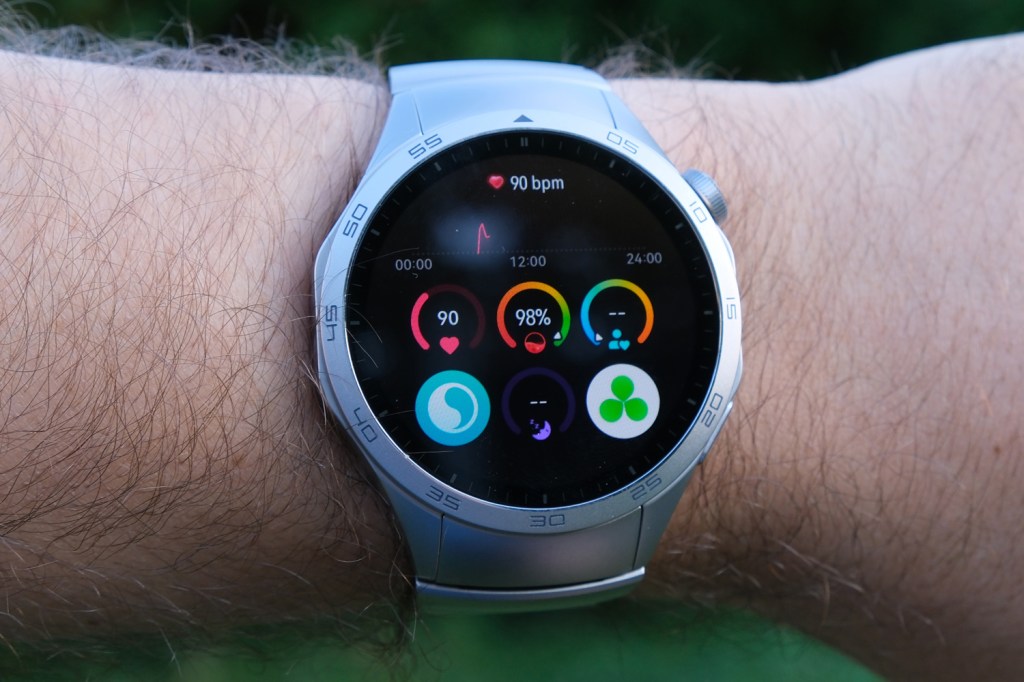

19. Huawei Watch GT 4
| Huawei Watch GT 4 specs | |
|---|---|
| Display | 1.43in, 466×466 OLED |
| Heart rate | Yes |
| Battery | Up to 14 days |
| Waterproof | 5ATM |
| Case size | 46mm or 41mm |
| Weight | 48g (excluding strap) |
There’s a lot to be said for a GPS sports watch that’s reliable, looks good and lasts for ages. The Huawei Watch GT 4 is all of those things. Sure, it could cost less, but if your priority is a ticker that doesn’t need a nightly charge and tracks your workouts and wellness with aplomb, it bests much of the competition.
By keeping its smart ambitions in check, the Huawei is able to serve up sensational longevity. Where an Apple Watch lasts 18 hours on a single charge, the Watch GT 4 can go for up to two weeks.
Styled like an actual watch (complete with rotating crown), the Watch GT 4 comes fronted by a 1.43in OLED display with a sharp 326 pixels per inch – perfectly complementing Huawei’s finger-friendly UI. There are some app limitations (there’s no Spotify) and issues with Huawei Wallet payments, but it’s otherwise broadly responsive.
As for tracking, the Huawei is a serious contender. It features all-day SpO2 monitoring, heart-rate tracking, GPS and a temperature sensor – plus more than 100 activity profiles. Downsides? Sleep tracking can be a bit hit and miss, and there’s no option to sync health data with Apple Health or Google Fit.
Also if you’re looking for the best workout headphones, we’ve got a selection for you to check out, too.
How to choose the best running watch for you
Not all activity watches are created equal. Some are sporting purebreds, designed to log your activity data alone. Others introduce a few smart features – think offline music and support for limited third-party services such as Strava – while only the full-fat smartwatches deliver a complete catalogue of apps and connectivity options. That’s where Stuff’s wearable experts come in, to help make your buying decision that little bit easier. Here are a few things to consider:
Route choice
GPS sports watches can log where you jog and track where you cycle. The accuracy and detail will normally depend on which of the standard satellite systems a watch supports; the best options will play nicely with several. Not sure which path to take? A number of the best sports watches also support offline maps and wrist-based navigation.
Tough choice
Most sports watches are built tough to some degree. That usually means waterproofing to at least 50m, plus a case sturdy enough to survive everyday bumps. If you’re a fan of particularly rugged pursuits, it’s worth choosing something more durable. The hardiest wristwear keeps ticking at 100m below the waves.
Multiple choice
Heart-rate monitors feature on the majority of sports watches. But the measurement of other metrics depends on the model in question. The best tickers can track your blood oxygen levels, keep an eye on your heart rate variability and even take echocardiograms, to confirm your blood pump’s tickety-boo.
Cell choice
Battery life varies wildly from watch to watch. Extra skills often come at the expense of battery life, which means smartwatches tend to top out at 24 hours. Models in the middle can offer several days of connected tracking, while pared-back options are usually good for weeks. Certain sports watches now also include solar recharging, for theoretically endless battery life.






